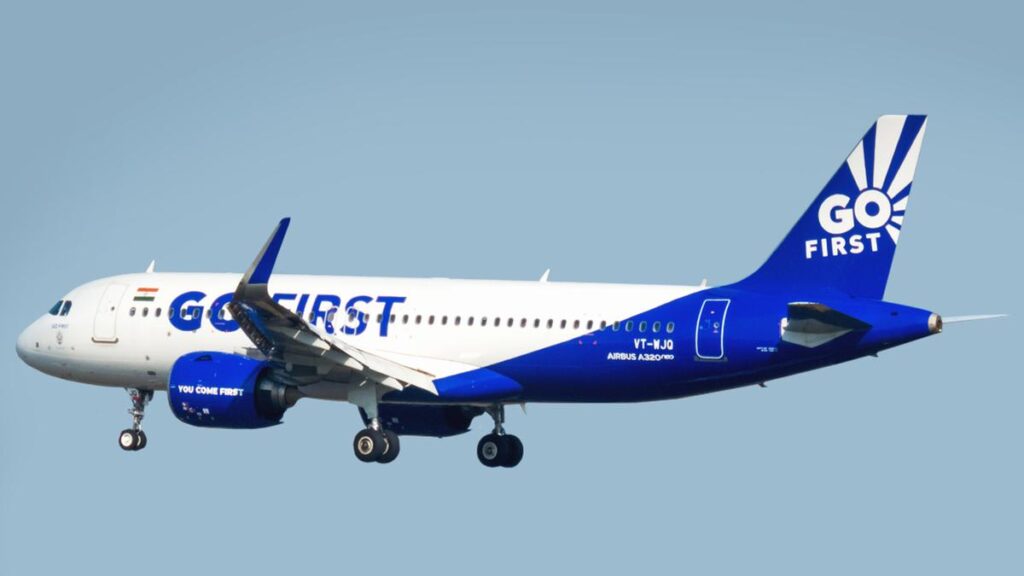Go First shares plummet as airline owes Rs. 6,521 crores to Bank of Baroda, IDBI Bank, and more
Go First, the embattled airline that filed for bankruptcy on Tuesday owes Rs 6,521 crore to Indian banks, including Bank of Baroda and IDBI Bank, who are among its financial creditors. According to the bankruptcy filing, the Central Bank of India and Deutsche Bank are also creditors of the airline.
Go First

Following the news, the Central Bank of India’s shares plummeted over 5% in early trade on Wednesday. Bank of Baroda, IDBI Bank, and Axis Bank also experienced a decrease in their shares by 2.5%, 1.1%, and 1.9%, respectively. Despite this, Go First stated in the filing that it had not defaulted on any dues as of April-end, as reported by Reuters.
However, the airline acknowledged in the filing that defaults to financial creditors would be imminent, given its present financial situation. Bank of Baroda and Central Bank of India has a joint exposure of Rs 1,300 crore under a consortium loan, while IDBI Bank’s exposure is relatively small at Rs 50 crore.
In a statement to stock exchanges, Axis Bank clarified that it has no outstanding exposure to the airline.
According to a filing, although it is unclear whether the airline utilized the credit, Axis Bank provided a letter of credit sanction to the airline. Meanwhile, a Central Bank of India official revealed that the bank’s overall exposure to the airline is Rs 2,000 crore.
The former head of retail research at SBI Securities and independent market expert, Mahantesh Sabarad, predicts that financial creditors will take a significant hit from the insolvency of Go First, with recoveries potentially reaching no more than 25-30%. However, Sabarad suggested that the airline could sell certain assets, such as aircraft on order and the termination of leases, for a reasonable price. While he acknowledged that some funds could be recovered, Sabarad emphasized that it may not exceed 25-30%, leaving banks with a substantial shortfall.
Go First
On Tuesday, Go First, owned by the Wadia Group, announced that it had filed for insolvency resolution, citing the grounding of half of its fleet due to Pratt & Whitney’s faulty engines, making it impossible to meet financial obligations. In a report last month, an anonymous source told ET that the Wadia Group planned to invest Rs 300 crore in Go First.
According to sources, Go First experienced its biggest annual financial loss in the fiscal year 2022, during which it suffered significant business losses despite a generally positive domestic aviation market. To support its operations during a time of increased air travel demand, the airline had obtained Rs 600 crore in loans from the government’s Emergency Credit Line Guarantee Scheme (ECLGS), and the Wadia group had also provided about Rs 3,000 crore in the past 15 months.
Reuters reported that the airline did not inform lenders of its decision to seek voluntary insolvency, and they will convene soon to evaluate the situation. This development occurred as the Indian government, particularly the state-run banks, has been working to alleviate the burden of bad loans on the country’s lenders.
Reserve Bank of India
According to the Reserve Bank of India’s Financial Stability Report, gross non-performing loans for Indian banks had dropped to a seven-year low of 5% as of September 2021, and stress tests indicated that lenders could absorb shocks even under adverse circumstances. However, state-run banks wrote off Rs 8.16 lakh crore of bad loans from their books between 2016 and 2022, and the latest data revealed that PSBs wrote off Rs 90,958 crore of bad loans in the first nine months of 2022-23.
In its filing, Go First reported total liabilities to all creditors, such as banks, financial institutions, vendors, and aircraft lessors, amounting to Rs 11,463 crore.
Go First further stated that its assets are presently inadequate to settle its liabilities, revealing the gravity of its financial situation.
The airline has failed to make payments to operational creditors, including Rs 1,202 crore to vendors and Rs 2,660 crore to aircraft lessors. According to the filing, some lessors have already initiated legal proceedings against the company to ground or repossess aircraft, while others have served notices for terminating lease agreements due to the company’s cash crunch.
Additionally, the filing revealed that six lessors have used letters of credit provided by lenders.
Also Read: Indian Aviation News
Private & Non-scheduled Charter operators in India
Go through, the Mall of Aviation
For the best HELIPAD CONSULTANCY



